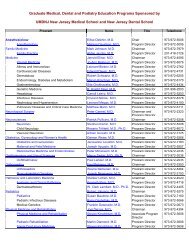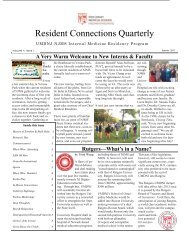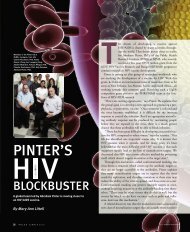changing the course of stroke - New Jersey Medical School ...
changing the course of stroke - New Jersey Medical School ...
changing the course of stroke - New Jersey Medical School ...
You also want an ePaper? Increase the reach of your titles
YUMPU automatically turns print PDFs into web optimized ePapers that Google loves.
alumnifocus PROFILE<br />
JeanMarie Houghton, MD, PhD<br />
Career<br />
Times Two<br />
EARNING TWO ADVANCED SCIENCE DEGREES may<br />
be <strong>the</strong> academic equivalent <strong>of</strong> climbing <strong>the</strong> Himalayas.<br />
Even with <strong>the</strong> ultimate tools <strong>of</strong> <strong>the</strong> trade in hand,<br />
achieving <strong>the</strong> peak is reserved for <strong>the</strong> most determined.<br />
Yet, at <strong>New</strong> <strong>Jersey</strong> <strong>Medical</strong> <strong>School</strong>, <strong>the</strong><br />
numbers <strong>of</strong> students currently in dual<br />
degree doctoral programs is soaring.<br />
This is <strong>the</strong> question that begs to be<br />
answered: Are two advanced degrees<br />
really better than one?<br />
Why would medical students—<br />
overworked, short <strong>of</strong> sleep and cash,<br />
and challenged with absorbing an everincreasing<br />
load <strong>of</strong> complex information—find<br />
value in pursuing a PhD?<br />
Why dedicate more than a decade (seven<br />
years <strong>of</strong> academic studies plus residency<br />
training) to graduate education?<br />
To find answers to <strong>the</strong>se questions,<br />
you may want to ask JeanMarie<br />
Houghton, MD, PhD. She was <strong>the</strong> first<br />
graduate <strong>of</strong> <strong>the</strong> physician-scientist program<br />
jointly run by NJMS and<br />
36<br />
PULSE SPRING 2003<br />
UMDNJ’s Graduate <strong>School</strong> <strong>of</strong> Biological<br />
Sciences. <strong>New</strong> <strong>Jersey</strong> born and<br />
bred, she grew up in Edison, graduated<br />
from Douglass College <strong>of</strong> Rutgers<br />
University in 1985, and entered medical<br />
school that year. “Initially, my goal was<br />
to become a good, old-fashioned practicing<br />
doctor,” she remembers.<br />
After earning her MD degree in<br />
1989, she completed a residency in<br />
internal medicine at University Hospital<br />
in 1992, serving as chief resident for<br />
one year. This was followed by a gastroenterology<br />
fellowship which she finished<br />
in 1994. With five years <strong>of</strong> handson<br />
clinical experience, she was ready—<br />
and looking forward—to hanging out<br />
her shingle.<br />
But Buzz Johanson, MD, <strong>the</strong>n <strong>the</strong><br />
chair <strong>of</strong> <strong>the</strong> Department <strong>of</strong> Medicine at<br />
NJMS, noticed Houghton’s tenaciousness<br />
and spark. He was convinced that<br />
not only would she make a great physician,<br />
but sure that she had <strong>the</strong> smarts<br />
and stamina to do original research and<br />
make contributions to academic medicine<br />
as well. He encouraged her to apply<br />
for a K11 Physician-Scientist Training<br />
Award from <strong>the</strong> National Cancer<br />
Institute and she was successful, garnering<br />
a $440,000, five-year grant.<br />
Winning grant funds is a necessary step<br />
to proceeding with this program.<br />
“Training physician-researchers is a<br />
national trend,” comments Jeff Wilusz,<br />
PhD, director <strong>of</strong> <strong>the</strong> MD/PhD program<br />
at NJMS and GSBS. “It’s certainly not<br />
something we invented here. The NIH<br />
and medical schools across <strong>the</strong> country<br />
believe this is important.” Forty percent<br />
<strong>of</strong> U.S. medical schools <strong>of</strong>fer NIHfunded<br />
dual doctoral degree programs.<br />
Historically, physicians diagnose disease<br />
and administer medical care to<br />
patients. Biomedical researchers work in<br />
PHOTOS BY DAN KATZ






